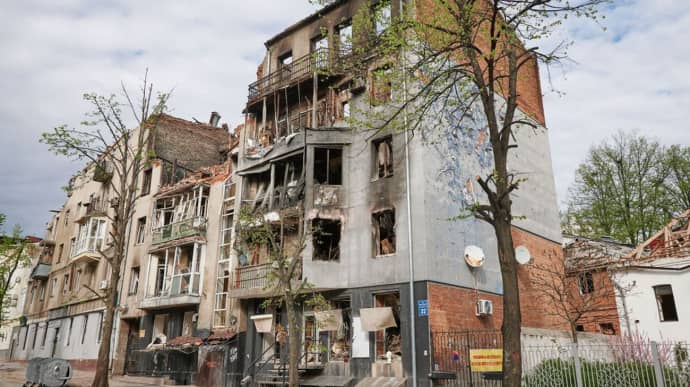Daily Flyer - March 26, 2024
A voice of Ukraine to the West

Number of injured in Russia's March 25 attack on Odesa rises to 10
The toll from Russia's assault on Odesa on March 25 has seen a distressing increase, with Odesa Oblast Governor Oleh Kiper confirming that the number of injured individuals has now reached 10.
Previously, the Southern Defense Forces had reported four injuries resulting from a Russian ballistic missile attack on the city. Kiper initially noted that three of the four injured were women, and thankfully, their injuries were not deemed severe.
However, Kiper's recent update on March 26 revealed a total of 10 individuals wounded, with seven still undergoing medical treatment.
Reports suggest that Russian forces employed a ruthless "double-tap" tactic, wherein a second missile struck shortly after the initial assault, potentially targeting first responders. Nataliia Humeniuk, spokesperson for Ukraine's Southern Operational Command, highlighted this barbaric strategy.
The strikes inflicted damage on Odesa's Palace of Sports and surrounding structures, with approximately 300 apartments sustaining damage. The Palace of Sports, a versatile sports complex featuring an indoor ice rink among other facilities, stands about five kilometers from the city center.
Kremlin's blaming of Ukraine for Moscow terrorist attack risks Russian security
The Kremlin's response to the tragic events at Crocus City Hall on March 22 highlights a concerning prioritization of blaming Ukraine over addressing internal security threats, according to the Institute for the Study of War (ISW).
In its recent report, the ISW points out that the Kremlin's insistence on Ukrainian involvement serves to perpetuate its narrative of justifying the ongoing invasion of Ukraine. By falsely portraying Ukraine as an existential threat to Russia, the Kremlin aims to garner support for its military actions.
Despite the Islamic State (IS) claiming responsibility for the attack, Russian authorities have detained four suspects, charging them with committing a terrorist act. However, the ISW suggests that the Kremlin may be overlooking the serious threat posed by IS and other extremist activities within Russia itself.
Rather than addressing internal security risks, the Kremlin appears focused on falsely accusing Ukraine to sway public opinion. Additionally, Russian leaders maintain ties with minority communities vulnerable to extremist recruitment, viewing them as assets in the conflict with Ukraine.
Russian ultranationalist voices have also echoed baseless claims blaming Ukraine for the attack, suggesting that IS lacks the capability to carry out such an operation. They propose a theory that the IS claim serves to conceal alleged Ukrainian and Western involvement, despite lacking evidence.
Furthermore, Russian propaganda suggests that IS operatives intended to escape into Ukraine, despite the illogical choice of an active war zone border. Vladimir Putin, while acknowledging the role of "radical Islamists" in the attack, has reiterated the suggestion of Ukrainian involvement, further complicating the narrative.
Russians hit Kharkiv with anti-ship missile
On March 26, a Russian Kh-35U anti-ship missile struck student accommodation at a sports college in Kharkiv's Shevchenkivskyi District, causing significant damage to the building's roof and upper floors, as reported by Serhii Bolvinov, Head of the Investigative Department of the General Directorate of the National Police in Kharkiv Oblast, on Facebook.
Bolvinov stated that the targeted site was student accommodation at a sports college, emphasizing that there were no soldiers or military equipment present at the time of the strike. Despite the absence of military targets, one civilian was injured in the powerful explosion.
Law enforcement officers swiftly responded to the incident, seizing the missile wreckage and meticulously documenting all evidence related to this heinous act of aggression, which is considered a war crime under international law.
Over 20,000 households remain without power in Odesa and Odesa district
According to Oleh Kiper, Head of Odesa Oblast Military Administration, about 23,000 households in the city of Odesa and the Odesa district are still without power following a recent Russian attack on power facilities.
Kiper stated, "As of 13:30, stabilization schedules are being applied in Odesa and the Odesa district. At the moment, 23,000 households are without power."
Additionally, Kiper noted that due to strong winds, power supply to 62 settlements, affecting 19,000 households, has been temporarily halted.
Russians hit residential neighbourhood in Kharkiv

Russian forces have launched a missile attack on a residential neighborhood in the city of Kharkiv, according to Mayor Terekhov.
Terekhov stated that the strike targeted the Shevchenkivskyi district of Kharkiv and emphasized that early reports indicate it hit a residential area. He further mentioned that while a non-residential building was damaged and windows shattered in a nearby high-rise building, there were fortunately no casualties.
Suspilne reported that an explosion occurred in the northern part of Kharkiv shortly before an air-raid warning was issued. Additionally, the Air Force warned of a threat from Russian air-launched weapons targeting frontline regions at 10:48.
During the attack, an air-raid warning was issued in Kharkiv Oblast from 10:26 to 11:15.
Ukraine receives third IMF tranche of US$880 million
Ukraine's Prime Minister Denys Shmyhal announced that the state budget received a third tranche of financial support on March 26 under the Extended Fund Facility (EFF) program from the International Monetary Fund, amounting to US$880 million.
According to Shmyhal, these funds will be instrumental in covering priority budget expenditures and maintaining macro-financial stability. He emphasized Ukraine's commitment to fulfilling its obligations to its partners and highlighted preparations for the next review of the program.

